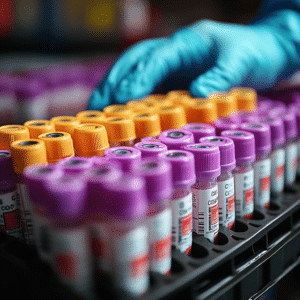When a child grapples with addiction, parents often wrestle with a profound emotional struggle known as anticipatory grief. This deep-rooted sorrow arises long before an actual loss and can be particularly intense for caregivers watching the compulsive behaviors that accompany addiction. Parents may find themselves on a relentless emotional rollercoaster, swinging between anxiety, hope, denial, and despair. Understanding anticipatory grief’s impact on emotional well-being is essential for navigating this difficult journey, where the impending loss feels like a slow death brought on by addiction.

The Complexity of Anticipatory Grief in Addiction Recovery
When we talk about anticipatory grief in the context of addiction, we must recognize how unique and layered this experience is. For many parents, the chaos intertwined with addiction complicates the anticipatory sense of loss they feel. Everyday interactions can feel fraught with tension, as parents grapple with their child’s choices and the looming potential for devastating outcomes. The unpredictability surrounding a loved one’s life due to addiction creates a landscape filled with anxiety and despair.
Feeling helpless is a common experience for parents in this situation. They often find themselves questioning their own choices, grappling with a sense of impending doom. Watching their child fight a battle against addiction can create emotional turmoil that doesn’t just fade away when the night ends. Instead, it can linger, casting shadows over their everyday lives and relationships.
It’s essential to grasp how this anticipatory grief manifests in parents. It often leads to a cycle of helplessness, anxiety, and denial regarding their child’s well-being. This cycle can feel like a heavy burden that parents must carry alone, amplifying feelings of isolation and contributing to their emotional distress.

5 Ways Anticipatory Grief Leads to Disproportionate Emotional Responses
It’s no secret that the uncertainty surrounding a child’s addiction can create waves of anxiety. Parents become hyper-vigilant, always on edge, waiting for the next shoe to drop. If a child is caught in a cycle of compulsive behaviors, parents oscillate between moments of hope and deep despair. It’s exhausting, and that anxiety can build a wall between them and those who want to help.
Feelings of guilt can fester like an open wound. Many parents ask themselves if they missed signs of trouble or wonder what they could have done differently. This sense of guilt doesn’t just impact emotional well-being; it perpetuates a cycle of codependency. Parents may slip into enabling behaviors, thinking they’re protecting their child from consequences, all while intensifying their own suffering.
The stigma associated with addiction can leave parents feeling like they’re on an island. Many withdraw from friends and family, fearing that no one will understand their plight. This isolation only deepens the anticipatory grief, creating a sense of loneliness that can be suffocating.
The toll that anticipatory grief takes isn’t just emotional; it can manifest physically. Chronic stress, anxiety, and the mental strain of watching a loved one battle addiction can lead to significant health issues like chronic fatigue and heart problems. This deterioration of physical well-being is often overlooked, yet it’s significant.
For many parents, their identity is intertwined with their roles as caregivers. When addiction grips a child’s life, parents may start to feel they’ve lost not just their child’s future but also parts of themselves. This crisis can lead to a significant identity shift, creating more emotional turmoil and confusion.
The Role of Codependency in Managing Anticipatory Grief
The relationship dynamics often change considerably in the context of anticipatory grief. Many parents get trapped in codependent cycles. They may feel a compulsion to fix their child’s problems, leading to enabling behaviors that prolong the very addiction they hope to alleviate.
For instance, consider a mother who frequently bails her son out of jail after drug-related offenses. Her motivations stem from love, but by shielding him from the consequences of his actions, she may inadvertently prolong his struggles. This not only contributes to their collective emotional suffering but propels her into deeper anticipatory grief, caught in a cycle of denial about the inevitable loss her actions might lead to.
Recognizing the signs of codependency is crucial. When parents start realizing their role in the cycle of addiction, it can be an eye-opening moment. Families can begin to dismantle this cycle, leading to healthier dynamics and an opportunity to emotionally heal.
Coping Strategies for Anticipatory Grief in the Context of Addiction
Knowing how to cope with anticipatory grief can be a lifeline for parents managing the turbulent waters of addiction. Here’s a list of strategies that can support emotional well-being:
Finding a support group can feel like a breath of fresh air. Many organizations, such as Al-Anon, offer a safe space for parents to share experiences and find understanding. Speaking to others on similar paths can help alleviate feelings of isolation and promote healing.
There’s no shame in asking for help. Professional counseling can provide valuable tools to manage anticipatory grief. Therapists who specialize in grief or addiction can guide parents through their stormy emotions, helping them rediscover their sense of self beyond caregiving.
Creating emotional distance is essential. Parents must learn to protect their mental well-being while still showing love and support for their children. Setting boundaries ensures they don’t compromise their emotional health in the quest to help.
Prioritizing self-care isn’t selfish; it’s necessary. Activities like yoga, mindfulness meditation, or even simple walks can significantly reduce stress levels. These practices empower parents, restoring a sense of control amidst chaos.
Knowledge is power. Understanding addiction through reading or attending workshops can enlighten parents and mitigate feelings of helplessness. Resources about addiction dynamics and treatment options can reduce anticipatory grief by offering a clearer view of the path ahead.
Navigating the Emotional Landscape of Anticipatory Grief
Traversing the emotional landscape of anticipatory grief can feel daunting, especially for parents of children battling addiction. It’s imperative to acknowledge the myriad emotions that accompany this journey, whether through despair or hope. Recognizing anticipatory grief’s intricacies allows for a path towards healing.
By engaging with their grief and their children’s struggles actively, parents can transform what feels like unending sorrow into empowerment. While the road ahead may be riddled with challenges, the proactive approach to managing anticipatory grief offers the potential for recovery and resilience. Light and hope can emerge, even from the depths of pain, as long as families support one another through every twist and turn on this emotional journey.
For those seeking additional resources, visit Mothers Against to learn more about coping strategies, treatment options, and support for families affected by addiction. Together, we can navigate this journey toward healing.
Anticipatory Grief: Understanding Its Emotional Waves
Anticipatory grief refers to the emotional suffering we experience when we know that a loss, such as a loved one struggling with addiction, is on the horizon. This type of grief can feel like a storm brewing inside us, challenging our emotional well-being long before the actual loss occurs. Interestingly, studies show that anticipatory grief can alter our mental health, leading to anxiety, depression, and even physical symptoms. It might feel a bit like the ups and downs of a movie like G-Force, where unexpected twists keep you on your toes.
Common Reactions to Anticipatory Grief
As we navigate this emotional landscape, it’s essential to recognize that anticipatory grief can manifest in various ways. Folks might experience changes in appetite, trouble concentrating, or even sleep disturbances. Just as many seek support through methods like stop smoking aids to tackle addiction-related challenges, it’s critical to explore healthy coping strategies during this sensitive time. Did you know some people turn to creative outlets or exercise routines to process their feelings? Incorporating lifestyle changes can be as impactful as choosing the right perfume, like Dolce and Gabbana, which can uplift one’s mood on a difficult day.
The Importance of Connection
While feeling the weight of anticipatory grief, connecting with others can be a saving grace. Engaging in conversations with family and friends or joining support groups provides a much-needed release. Often, these interactions can trigger curiosity or laughter, reminiscent of fun facts about celebrities—the kind that could almost surprise you like discovering that Michael Cera had a cameo in Barbie! It reminds us that life goes on, even amid sorrow. Taking positive steps, such as trying out a Cvs Covid test kit when feeling under the weather, not only helps manage physical health but also serves as a reminder that caring for ourselves is vital through tough emotional spells.
To wrap it up, anticipatory grief brings forth a plethora of emotions that impact our well-being. Recognizing common reactions, seeking support, and embracing connection are just a few strategies to help us navigate the storm. While it can feel overwhelming, remember that coping strategies, such as understanding potato nutrition, can lift your spirits, much like a well-curated playlist for tough days.





























